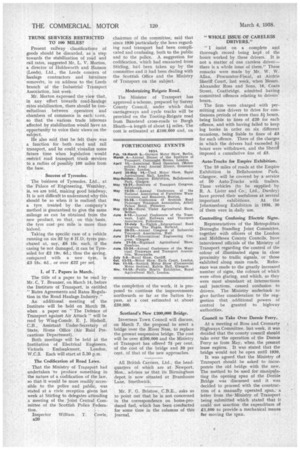TRUNK SERVICES RESTRICTED TO 100 MILES?
Page 30

If you've noticed an error in this article please click here to report it so we can fix it.
Present railway classifications of goods should be discarded, as la step towards the stabilization of road and rail rates, suggested Mr, L. V. Morton, a director of Holdsworth and Hanson (Leeds), Ltd., the Leeds concern of haulage contractors and furniture removers, in an address to the Leeds branch of the Industrial Transport Association, last week.
Mr. Morton expressed the view that, in any effort towards road-haulage rates stabilization, there should be Consultations between operators and chambers of commerce in each town, so that the various trade interests affected by stabilization would have an opportunity to voice their views on the subject.
He also said that he felt there was a function for both road and rail transport, and he could visualize some future time when legislation would restrict road transport trunk services to a radius of possibly 100 miles from the base.
Success of Tyresoles.
The business of Tyresoles, Ltd., at the Palace of Engineering, Wembley, is, we are told, making good headway. It is not difficult to understand why this should be so when it is realized that a tyre. treated by the company's method is guaranteed to give the same mileage as can be obtained from the new product, so that, on this basis, the tyre cost per mile is more than halved.
Taking the specific case of a vehicle running on six 32 by 6 H.D. tyres purchased at, say, £6 15s. each, if the casing be not damaged, it can be Tyresoled for £2 19s. 6d.; thus the saving, compared with a new tyre, is £3 15s. 6d., or over £.22 per set.
I. of T. Papers in March.
The title of a paper to be read by Mr. C. T. Brunner, on March 14, before the Institute of Transport, is entitled "Rates Agreements and Rates Regulation in the Road Haulage Industry."
An additional meeting of the Institute will be held on March 28, when a paper on "The Defence of Transport against Air Attack" will be read by Wing-Comdr. E. J. Hodsoll, C.B., Assistant Under-Secretary of State, Home Office (Air Raid Precautions Department).
Both meetings will be held at the Institution of Electrical Engineers, Victoria Embankment, London, W.C.2. Each will start at 5.30 p.m.
The Codification of Road Laws, That the Ministry of Transport had undertaken to produce something in the nature of a codification of the law, so that it would be more readily accessible to the police and public, was stated at a civic reception given last week at Stirling to delegates attending a meeting of the 'Joint Central Committee of the Scottish Police Federation.
Inspector William T. Cowie, B20 chairman of the committee, said that since 1930 particularly the laws regarding road transport had been complicated and confusing, both to the public and to the police. A suggestion for codification, which bad emanated from Stirling, had been taken up by the committee and it had been dealing with the Scottish Office and the Ministry of Transport on the subject.
Modernizing Reigate Road.
The Minister of Transport has approved a scheme, prepared by Surrey County Council, under which dual carriageways and cycle tracks will be provided on the Tooting-Reigate road from Banstead cross-roads to Burgh Heath—a length of about 11 miles. The cost is estimated at £100,000 and, on
the completion of the work, it is proposed to continue the improvements northwards so far as the Sutton bypass, at a cost estimated at about £50,000.
Scotland's New 1200,000 Bridge.
Inverness Town Council will discuss, on March 7, the proposal to erect a bridge over the River Ness, to replace the present suspension bridge. The cost will be over £200,000 and the Ministry of Transport has offered 75 per cent, of the cost of the bridge and 50 per cent, of that of the new approaches.
All British Carriers, Ltd., the headquarters of which are at Newport, Mon., advises us that its Birmingham depot is now situated at Brasshouse Lane, Smethwick.
Mr. F. G. Bristow, C.B.E., asks us to point out that he is not concerned in the correspondence on home-produced fuel, which has been conducted for some time in the columns of this journal.




















































































